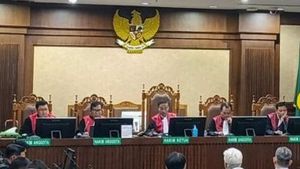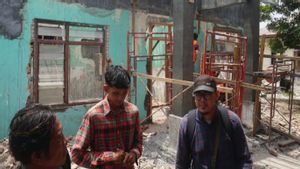JAKARTA - Many women in South Korea choose to freeze their eggs and are not in a hurry to have children because of the high cost of housing and education in the country.
Lim Eun-young, a 34-year-old civil servant, said she was not ready to start a family because of the costs and because she only started dating her boyfriend a few months ago. However, worried about her "biological clock ticking", she decided to freeze some of her eggs last November.
Lim was one of about 1,200 single, unmarried women who underwent the procedure last year at CHA Medical Center. CHA is the largest network of fertility clinics in South Korea with about 30 percent of the in vitro vertiization (IVF) market.
"It's such a relief and gives me peace of mind knowing I have healthy eggs frozen here," Lim said.
Freezing eggs to delay reproductive time is an option that more and more women around the world are exploring. But in South Korea, which has one of the lowest fertility rates in the world, the dramatic surge in the number of women using CHA services has relieved the economic burden and social constraints that led to decisions to postpone or even not have children.
The fertility rate—the average number of children born to a woman during her reproductive years—in South Korea was only 0.81 last year, compared with an average rate of 1.59 in OECD countries in 2020.
That figure is also despite the enormous amounts spent by South Korean authorities on subsidies and benefits for families with children.
The government budgeted 46.7 trillion won (approximately IDR 530.6 trillion) last year to fund policies aimed at tackling the country's low birth rate.
South Korea's reluctance to have children is mainly due to the highly competitive and expensive education system, not only for schools but also private tutoring for most children from a young age.
"We hear from married couples who watch reality TV about how expensive it is to raise children in terms of education and everything, and all this worry translates into fewer marriages and babies," Lim said.
Housing costs have also soared. The average apartment in Seoul, for example, costs about 19 years of South Korea's median annual household income, up from 11 years in 2017.
Cho So-Young, a 32-year-old nurse at CHA who plans to freeze her eggs next July, also wants to be in better financial shape before having children.
"If I got married now and gave birth, I couldn't give my baby the environment I had when I was growing up. I wanted better housing, a better environment and better food to eat," she said.
But even when finances are less of a consideration, getting married is seen as a prerequisite for having children in South Korea. Only 2 percent of births in South Korea occur out of wedlock compared to an average of 41 percent in OECD countries.
In fact, while single South Korean women can freeze their eggs, they cannot legally accept sperm donations and implant embryos unless married.
This is an issue highlighted by Sayuri Fujita, a Japanese celebrity and single mother based in South Korea who has to return to Japan to donate sperm.
According to Jung Jae-hoon, professor of social welfare studies at Seoul's Women University, the habit needs to change.
He noted that marriages in South Korea fell to a record low of 192,500 last year, or down about 40 percent from a decade earlier.
Even when looking at the marriage rate in 2019 to ignore the impact of the pandemic, the drop is still huge at 27 percent.
"The least the government can do is not hinder people out there who are willing to bear the financial burden of having a baby," he said.
Even more worrying are the statistics showing a sharp decline in the desire to have children at all.
About 52 percent of South Koreans in their 20s do not plan to have children when they marry. That's a jump from 29 percent in 2015, according to a survey conducted in 2020 by the country's ministry of gender and family.
The English, Chinese, Japanese, Arabic, and French versions are automatically generated by the AI. So there may still be inaccuracies in translating, please always see Indonesian as our main language. (system supported by DigitalSiber.id)













